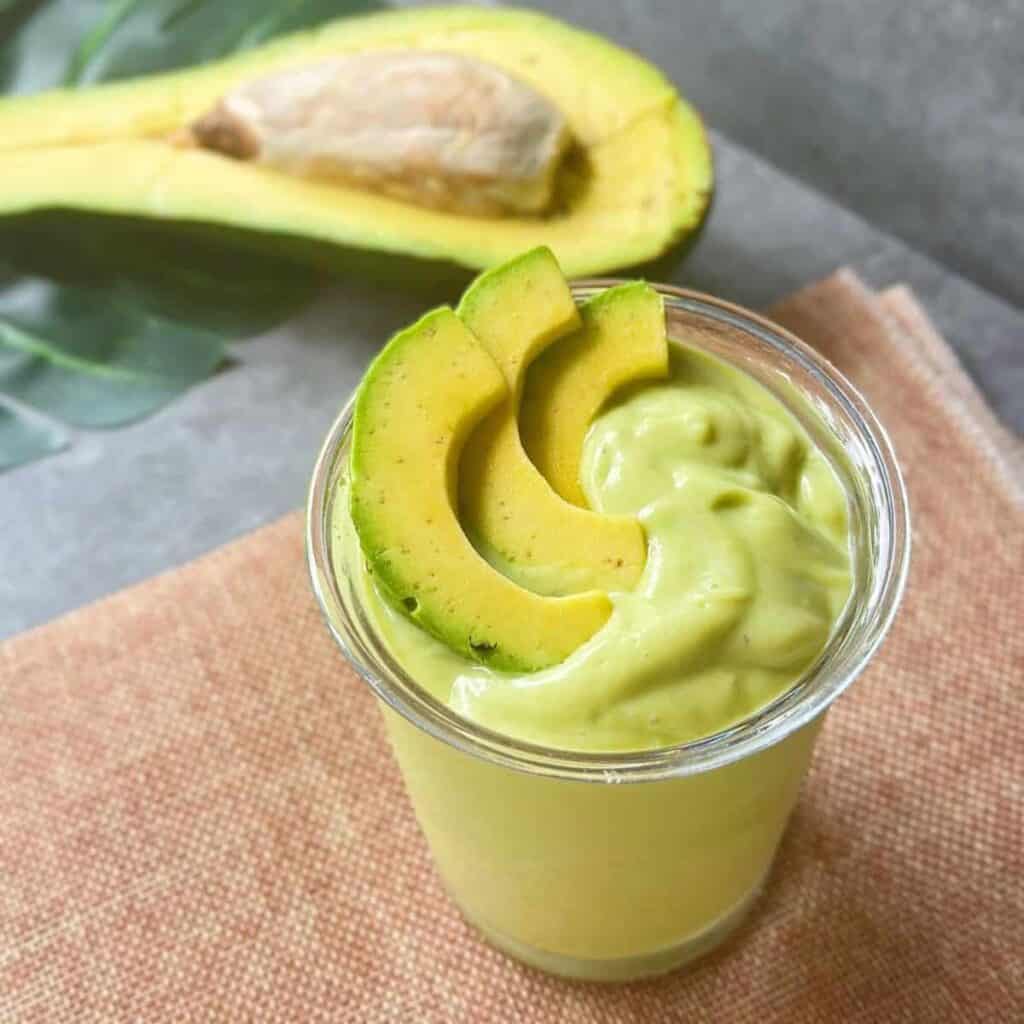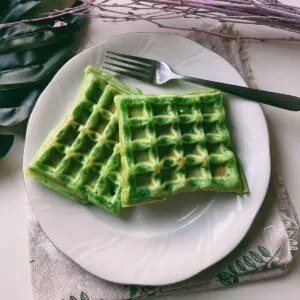Bánh Kẹp Lá Dứa—Vietnamese Pandan Waffles—are a little piece of happiness in your hand. Crunchy on the outside, tender and chewy inside, they’re packed with the creamy richness of coconut milk and the sweet, grassy fragrance of pandan.

What is Pandan?
If you’re in a hurry and just want to get cooking, feel free to jump into the recipe card.

Asian-inspired desserts are all the rage these days (and I really hope they don’t get over-gentrified). After matcha and ube, I wouldn’t be surprised if pandan, taro, Thai milk tea, or Vietnamese coffee become the next big things.
Pandan is Southeast Asia’s answer to vanilla: subtly sweet, incredibly fragrant, and naturally dyed a soft, cheerful green. It pops up in everything—from desserts to savory dishes—across Malaysia, Indonesia, Singapore, Thailand, and Vietnam.
In Singapore, a typical breakfast might be kaya toast—crispy toast spread with kaya, a sweet coconut custard, and topped with a perfectly poached egg. Or you might find yourself reaching for the iconic pandan chiffon cake, a light and fluffy treat you just can’t miss.

In Vietnam, pandan leaves (lá dứa or lá nếp) are a kitchen staple, adding their sweet, fragrant magic to chè, sticky rice, and chicken rice dishes. Just one leaf can turn plain jasmine or coconut rice into something wonderfully aromatic and comforting.
Pandan also stars in traditional treats like pandan honeycomb cake (bánh bò nướng lá dứa) and the layered pandan-mung bean cake (bánh da lợn).
Natural or Artificial Extract?
Natural extracts give the most authentic, rich flavor—but don’t always give that bright, picture-perfect color we sometimes hope for.
Take taro, for instance. Growing up, I thought it was always that vivid purple, like in my favorite taro milk tea or violet taro ice cream. In reality, most homemade taro desserts come out light gray, with just a whisper of purple!
Pandan is a little different. It doesn’t add much texture or strong flavor like taro—it’s all about the fragrance and that soft green color.
I usually reach for natural pandan extract whenever I can—like in this vegan pandan bread. But on lazy days, store-bought pandan extract is a quick, fuss-free option that still works beautifully. Just a small tip—too much and your dessert can turn a neon green so bright it almost looks otherworldly!

Texture is everything!
These coconut pandan waffles get their magic from a mix of three flours—tapioca starch, rice flour, and all-purpose flour. The result? Crispy on the outside, soft and chewy in the center.
The inside has that gentle, mochi-like chew, but it’s really the pandan aroma and rich coconut flavor that set these waffles apart from the usual kind.

Tapioca, made from cassava, is what gives that signature chew. So, if you love these pandan waffles, you’ll probably fall for Vietnamese cassava cake or Korean mochi bread too—they all have that same irresistible, bouncy texture.
Ingredients
- Rice flour – Helps create a crisp, golden exterior for the waffles.
- Tapioca starch – Gives the inside that soft, chewy, slightly bouncy texture.
- All-purpose flour – Adds fluffiness and structure so the waffles aren’t too dense.
- Coconut milk – Brings richness, creaminess, and a subtle tropical flavor.
- Pandan extract – Gives the waffles their signature fragrant aroma and soft green color.
- Eggs – Bind the batter together and add a little lift.
- Cooking oil – Keeps the waffles tender and prevents sticking.
- Sugar – Adds sweetness to balance the coconut and pandan flavors.
- Salt – Enhances all the flavors in the batter.
- Baking powder – Helps the waffles puff up slightly and stay light.
Instructions

Step 1: Mix the wet ingredients
In a large bowl, whisk together coconut milk, eggs, cooking oil, pandan extract, sugar, and salt until well combined.
Step 2: Prepare and combine the dry ingredients
In a separate bowl, sift together tapioca starch, rice flour, all-purpose flour, and baking powder. Gradually add the dry mix into the wet ingredients until just combined. A few lumps are okay.
Step 3: Rest the batter
Strain the batter to remove any clumps, cover the bowl, and let it rest for 20–30 minutes. This helps the texture develop perfectly.
Step 4: Cook the waffles
Preheat your waffle maker and brush with a little melted butter, even if it’s non-stick. Give the batter a quick stir, then pour 3–4 scoops (adjust for your waffle iron) onto the plates. Close the lid and cook until no more steam rises and the waffles are golden, crispy on the outside, and soft inside.





Expert Tips
Weigh your ingredients – Using a digital scale instead of cups makes your waffles more consistent every time.
Check your baking powder – Make sure it’s fresh so your waffles rise perfectly and stay fluffy.
Storing
To keep your Vietnamese coconut pandan waffles fresh, pop them into a resealable bag or airtight container and store them in the freezer for up to 2 months.
When you’re ready to enjoy them again, there are a few ways to reheat:
- Warm them gently in a waffle maker on a low setting.
- Use an air fryer or toaster oven to bring back that crispy exterior.
Variations & Ideas
Bánh Kẹp Lá Dứa was one of my favorite snacks growing up. On its own, it’s already amazing—but in Vietnam, we often enjoy it in a few different ways.
With pandan coconut sticky rice and shredded coconut – a nostalgic breakfast from my childhood.
As a waffle ice cream sandwich – tuck a scoop of coconut ice cream or pandan ice cream between two pandan waffles, and you’ve got a simple, irresistible treat.
As a light snack or mini meal – Just like pâté chaud or bánh bao, this pandan waffle is my all-time favorite snack.
Other Asian Desserts to Try

(Vietnamese Banana Ice Cream)

(Vietnamese Avocado Smoothie)

(Vietnamese Flan)

Easy Vietnamese Pandan Waffles (Bánh Kẹp Lá Dứa)
Equipment
- 2 Mixing bowls
- 1 Whisk
- 1 Strainer
- 1 Waffle maker
Ingredients
- 3 eggs (L size)
- 2 cup rice flour (280g)
- ½ cup all-purpose flour (75g)
- ½ cup tapioca starch (75g)
- 1 can coconut milk (400ml/14 oz)
- ⅞ cup sugar (175g)
- 1 tbsp cooking oil
- ½ tsp salt
- ½ tsp pandan extract
- 1½ tsp baking powder
Instructions
- In a large bowl, combine all the liquid ingredients—coconut milk, eggs, cooking oil, and pandan extract. Add sugar and salt. Use a whisk or hand-mixer to thoroughly mix the ingredients until well combined.
- In a separate bowl, mix together tapioca starch, all-purpose flour, rice flour, and baking powder. Sift the dry ingredients to ensure they are thoroughly blended.
- Gradually add the sifted dry ingredients to the liquid mixture, stirring well to form a smooth batter. It's normal for the batter to have a slightly lumpy texture due to the tapioca starch.
- To remove any remaining clumps by straining the batter. Cover the bowl and let the batter rest for 20-30 minutes, allowing it to develop its flavors.
- Preheat your waffle maker. To enhance the flavor and create a nice crust, you could brush some melted butter onto the waffle surface.
- Before cooking, give the waffle batter a quick mix as it may have separated slightly during the resting time. Use a ladle to pour three to four scoops of batter onto the waffle iron, adjusting the amount based on the size of your waffle iron.
- Cook the waffles until no more steam is rising from the waffle maker, which means the waffles are fully cooked.
Notes
How to make the perfect waffles:
- Use a digital scale instead of the cup to weigh the ingredients accurately.
- Check your baking powder before making the waffles.


I really wanted to make this but how many eggs do I use? 😮
Oh sorry, my bad :(. You will need 3 eggs (L size) for this recipe.
Happy cooking 🙂 !
[…] Vietnamese Coconut Pandan Waffles (Bánh Kẹp Lá Dứa) boast a delightful contrast of textures, tastes, and colors! The richness of coconut milk and the sweet fragrance of Pandan (Asian vanilla) are sure to impress your family or Sunday brunch guests! […]
Delicious! Do you really use 280g rice flour?
And 75g Tapioca starch?
Or the other way around?
Since this recipe doesn’t require precise measuring, I use a cup to measure rice flour and tapioca starch. You could also weigh them and adjust the amount of rice flour to achieve the desired consistency :).
Can the mix be made a couple days in advance? can we store mix in fridge?
Yes, you can mix all the ingredients in advance (leaving out the baking powder) and keep the mixture in the fridge for up to 7 days. Just incorporate the baking powder before you start baking